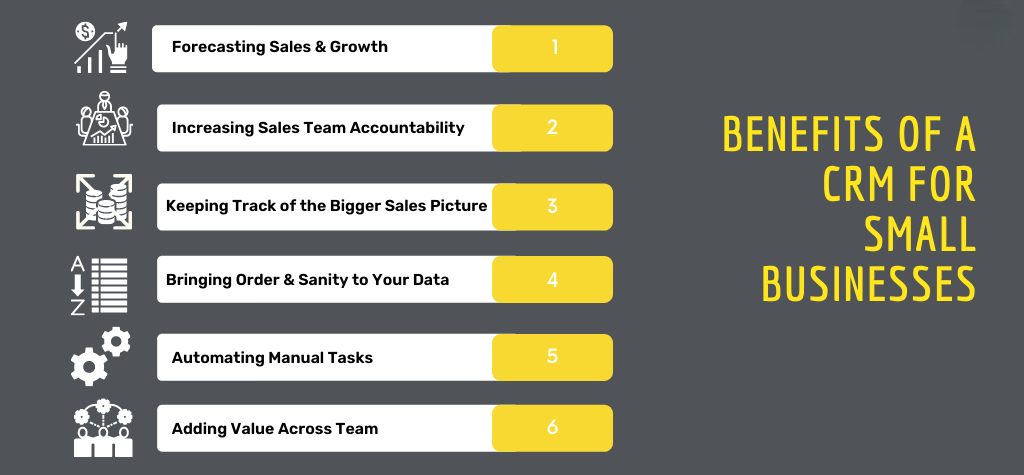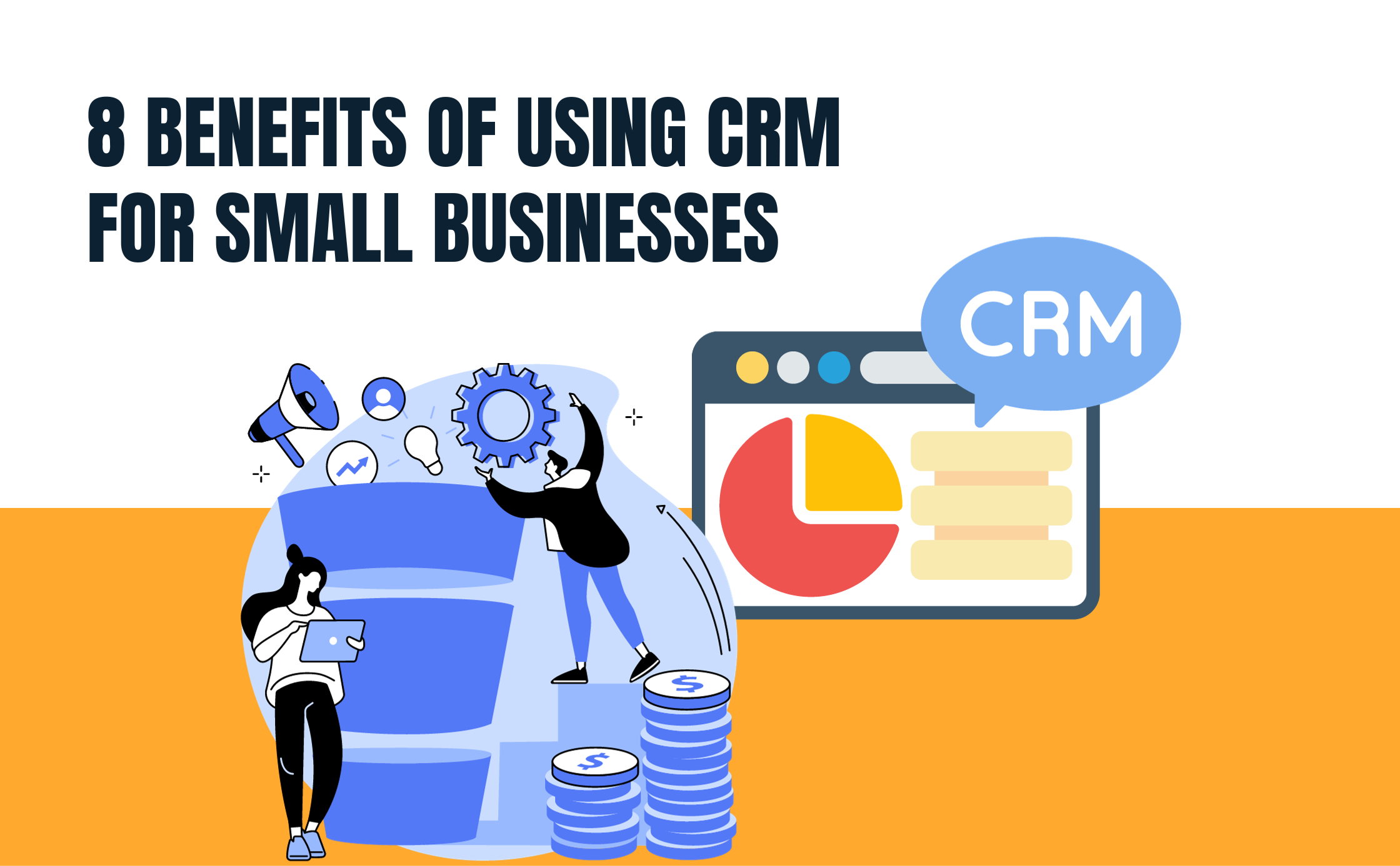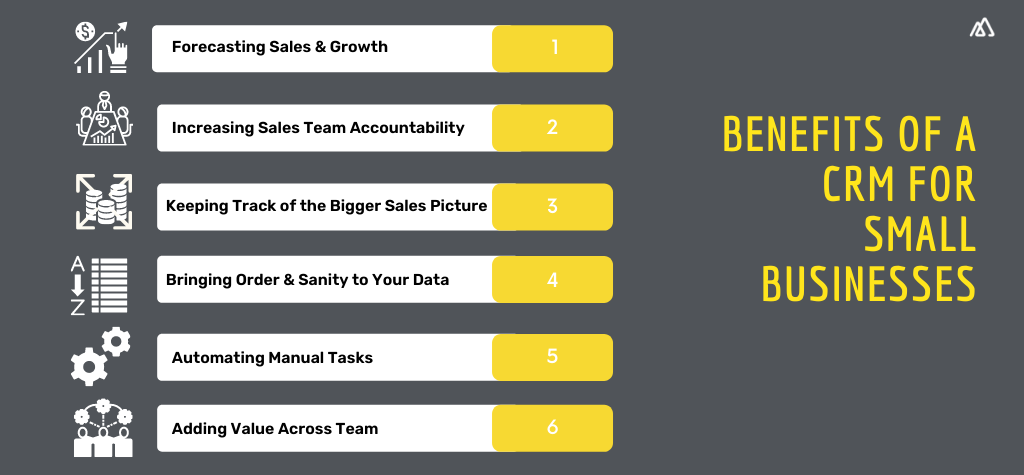Customer Relationship Management (CRM) systems are essential tools for businesses. They help manage interactions with customers efficiently.
For small businesses, adopting a CRM can seem daunting. Resources are limited, and costs need careful consideration. Yet, the benefits can be significant. From improving customer service to increasing sales, a CRM system can transform how a small business operates.
It organizes customer information, tracks interactions, and streamlines processes, making it easier to manage relationships. With proper implementation, a CRM helps small businesses stay competitive, grow, and thrive in today’s market. This blog will explore how CRM systems can benefit small businesses and why they are worth considering. Stay tuned to discover how a CRM can make a big difference for your small business.
Introduction To Crm For Small Businesses
A Customer Relationship Management (CRM) system helps small businesses manage interactions with customers. It is a tool designed to help organize, automate, and synchronize sales, marketing, customer service, and technical support. For small businesses, implementing a CRM system can provide significant advantages. These include improving customer relationships and increasing sales.
Why Small Businesses Need Crm
Small businesses often struggle to keep track of customer interactions. A CRM system centralizes all customer information. It ensures that no details are lost. This system helps in managing leads more effectively. It also ensures timely follow-ups.
Small businesses can benefit from CRM in several ways:
- Improved Customer Service: CRM stores all customer data, making it easier to provide personalized service.
- Increased Sales: By tracking customer behavior, businesses can identify opportunities to upsell or cross-sell.
- Better Communication: CRM systems streamline internal communication among team members.
- Enhanced Reporting: Businesses can generate detailed reports to analyze performance.
Key Features Of Crm
CRM systems come with a variety of features designed to help small businesses grow. Here are some of the key features:
| Feature | Description |
|---|---|
| Contact Management | Stores customer information such as names, addresses, and phone numbers. |
| Sales Management | Tracks sales activities from leads to conversion. |
| Task Automation | Automates repetitive tasks like follow-up emails and reminders. |
| Analytics and Reporting | Provides insights and reports on sales performance and customer behavior. |
| Customer Segmentation | Divides customers into groups based on criteria like purchase history. |
In summary, a CRM system is a valuable tool for small businesses. It helps manage customer relationships and boosts sales. Implementing CRM can lead to more efficient operations and improved customer satisfaction.

Credit: medium.com
Improved Customer Relationships
Building strong customer relationships is vital for small businesses. A Customer Relationship Management (CRM) system helps improve these relationships. It offers tools to engage with customers effectively. Let’s explore how CRM helps small businesses enhance customer relationships.
Personalized Customer Interactions
CRM systems store detailed customer information. This includes purchase history and preferences. With this data, small businesses can create personalized experiences. Personalization makes customers feel valued. It shows that the business understands their needs. Tailored interactions can lead to increased customer satisfaction.
Customer Retention Strategies
Customer retention is key for long-term success. CRM systems offer features to keep customers engaged. Businesses can set up automated follow-ups. They can send reminders about upcoming promotions. Regular communication helps maintain customer interest. This increases the chances of repeat purchases. CRM tools also help identify at-risk customers. Early intervention can help retain these customers.
Enhanced Sales Performance
Enhanced sales performance is a key benefit of using CRM systems for small businesses. By leveraging CRM tools, small business owners can improve sales efficiency and gain valuable insights. This, in turn, leads to better decision-making and increased revenue.
Sales Tracking And Reporting
CRM systems help in monitoring sales activities. They provide a clear picture of the sales pipeline. This allows businesses to track progress and identify bottlenecks. Real-time reporting features offer detailed insights into sales metrics.
| Metric | Description |
|---|---|
| Sales Pipeline | Stages of the sales process |
| Conversion Rates | Percentage of leads converted to customers |
| Revenue Forecast | Predicted revenue from current opportunities |
Lead Management
Efficient lead management is crucial for business growth. CRM systems help in capturing and nurturing leads. Businesses can segment leads based on various criteria. This enables targeted communication and personalized marketing.
Key benefits of CRM lead management include:
- Automated lead capture
- Lead scoring and prioritization
- Streamlined follow-up processes
Using a CRM system ensures no lead is overlooked. This increases the chances of conversion.

Credit: townsquareinteractive.com
Streamlined Communication
Effective communication is vital for small businesses. A Customer Relationship Management (CRM) system helps in streamlining communication. This ensures every team member is on the same page. Here’s how CRM benefits small businesses through streamlined communication.
Centralized Communication Channels
A CRM system centralizes all communication channels. Emails, phone calls, and chat messages are stored in one place. Team members can access these records easily. This reduces confusion and ensures everyone has the latest information.
| Communication Type | Benefits |
|---|---|
| Track conversations, set reminders | |
| Phone Calls | Record calls, log call details |
| Chat Messages | Store chat history, quick reference |
Automated Follow-ups
CRMs help in automating follow-ups. You can set reminders for follow-up emails and calls. This ensures no lead is missed. Automated follow-ups save time and effort. They help in building strong relationships with customers.
- Emails: Schedule and send follow-up emails automatically.
- Calls: Set reminders for follow-up calls.
- Tasks: Create tasks for follow-ups and assign to team members.
By automating these tasks, small businesses can focus on growth. Automated follow-ups ensure timely communication. This keeps customers engaged and satisfied.
Increased Productivity
Small businesses can significantly benefit from a CRM system. One key advantage is increased productivity. CRM tools streamline operations, making tasks more efficient. This helps employees focus on more critical activities, driving business growth.
Task Automation
CRM systems offer task automation, which reduces manual work. This feature saves time and minimizes errors. Employees can set up automated workflows for repetitive tasks.
- Automated email responses
- Sales follow-up reminders
- Customer service ticketing
These automations ensure no task is overlooked. This keeps the business running smoothly. It also allows employees to concentrate on more complex tasks that need human intervention.
Time Management Tools
Effective time management is crucial for productivity. CRM systems come with built-in time management tools. These tools help employees manage their schedules more effectively.
| Feature | Benefit |
|---|---|
| Shared Calendars | Coordinate meetings and deadlines easily |
| Task Lists | Track tasks and priorities |
| Alerts and Notifications | Stay on top of important activities |
These tools ensure that all team members are on the same page. This reduces the chances of missed deadlines. It also improves overall workflow efficiency.
By leveraging a CRM, small businesses can enhance productivity. Task automation and time management tools are vital components of this process.
Better Data Management
Better data management is crucial for small businesses. It ensures all customer information is organized, accessible, and secure. A CRM system offers several benefits to improve data management, such as data centralization and data security. Let’s explore these benefits in detail.
Data Centralization
A CRM system centralizes all customer data in one place. This means every customer interaction, transaction, and note is stored in a single database. No more scattered spreadsheets or lost emails. Everything is easy to find.
With data centralization, small businesses can:
- Access information quickly
- Reduce data duplication
- Improve team collaboration
For example, a salesperson can view a customer’s purchase history before a call. This helps them provide personalized service. Better data management leads to better customer relationships.
Data Security
Data security is a top priority for small businesses. A CRM system offers robust security features to protect customer information. It uses encryption, secure access, and regular backups.
Data security helps small businesses:
- Prevent data breaches
- Comply with data protection laws
- Build customer trust
For example, role-based access control ensures only authorized employees can view sensitive data. Regular backups ensure data is not lost in case of system failure.
By using a CRM system, small businesses can ensure their data is safe and secure. This provides peace of mind for both the business and its customers.
Cost-effective Solutions
Small businesses often have tight budgets. They need cost-effective solutions to manage customer relationships. A CRM system is a great option. It helps businesses stay organized and improve customer service without breaking the bank.
Affordable Crm Options
Many CRM providers offer affordable plans for small businesses. These plans come with essential features to manage customer data and track interactions. Here are some popular affordable CRM options:
- HubSpot CRM: Free plan with basic features.
- Zoho CRM: Starts at $12 per user per month.
- Freshsales: Starts at $15 per user per month.
- Insightly: Starts at $29 per user per month.
Return On Investment
Investing in a CRM system can lead to a high return on investment (ROI). Here’s how:
- Improved Customer Retention: CRMs help track customer interactions. This leads to better service and higher retention rates.
- Increased Sales: CRMs streamline sales processes. They help identify and follow up on leads, leading to more sales.
- Better Marketing Campaigns: CRMs provide valuable customer data. This data helps create targeted marketing campaigns that are more effective.
Consider the costs and benefits. A CRM system can save time, improve customer satisfaction, and increase revenue. This makes it a smart investment for small businesses.

Credit: kylas.io
Scalability For Growth
Scalability is crucial for small businesses aiming to grow. A CRM system helps manage growth efficiently. As your business expands, a CRM can adapt to increased demands. This ensures smooth operations and maintains customer relationships. Let’s explore how CRM aids in adapting to business growth and offers flexible solutions.
Adapting To Business Growth
Every business aspires to grow. Growth brings new challenges. Managing customer data becomes complex. A CRM system can scale with your business. It handles an increasing amount of data. This helps maintain a high level of customer service. A growing business needs efficient processes. CRM systems provide just that. They automate routine tasks. This frees up time for more critical activities.
Flexible Crm Solutions
CRM solutions are not one-size-fits-all. They offer flexibility to meet specific needs. As your business grows, you can customize your CRM. This ensures it continues to meet your requirements. Adding new features is easy. You can integrate with other tools your business uses. This makes the system even more powerful. A flexible CRM grows with your business. It evolves to handle new challenges and opportunities.
Frequently Asked Questions
What Is A Crm System?
A CRM system helps businesses manage customer relationships. It streamlines processes, improves customer service, and boosts sales.
Why Should Small Businesses Use Crm?
Small businesses benefit from CRM by improving customer interactions. It helps in tracking leads, managing sales, and enhancing productivity.
How Does Crm Improve Sales?
CRM improves sales by organizing customer data. It enables better follow-ups, targeted marketing, and efficient sales processes.
Can Crm Save Small Businesses Time?
Yes, CRM automates repetitive tasks. It reduces manual work, allowing small businesses to focus on growth and customer service.
Conclusion
Small businesses gain many benefits from using CRM systems. They streamline operations, save time, and enhance customer relationships. CRM tools improve organization and boost productivity. Small teams can manage tasks more efficiently. Customer data becomes easy to access and analyze.
This leads to better decision-making and growth. Adopting a CRM is a smart move for any small business aiming for success. Invest in a CRM today and see the positive impact on your business.




